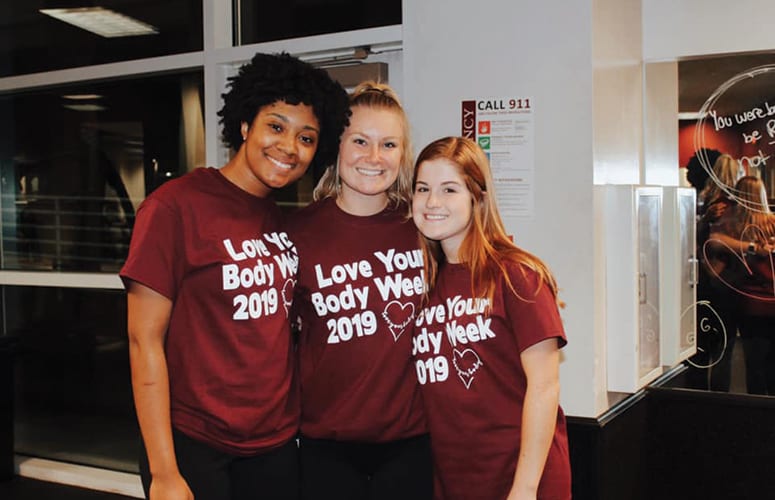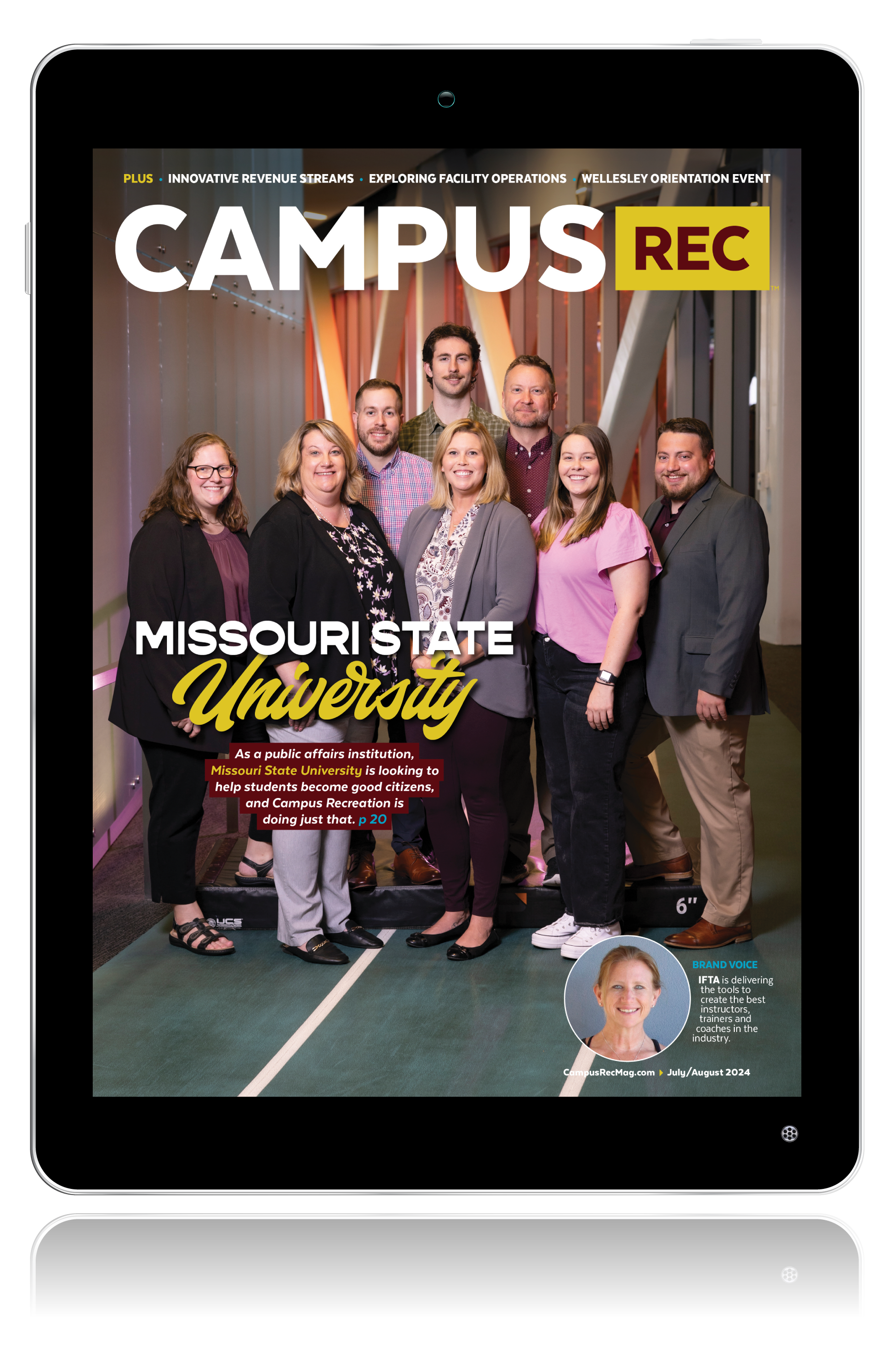Since 2013, Virginia Tech has seen a 40% increase in demand for counseling services.
It’s one of many stats that speak to the growing concern around mental health. “I think it’s accurate to call it a crisis,” said Alison Cross, the director of recreational sports at Virginia Tech.
Multiple things have led to what Cross noted is a downward spiral of students: increased levels of anxiety, depression, effects of social media, suicidal ideation, decrease in close friendships, decline in physical activity, growing “on-demand” culture, overdependent relationships with parents, hyper organization, etc. While students at Virginia Tech fare better than the national average, she said they still aren’t headed in the right direction.
At Elon University, one particular way the crisis has been described is via the “culture of busy-ness” on campus. “We have talked at length about replacing that with a culture of purpose; focusing on depth over breadth,” said Larry Mellinger, the director of campus recreation and wellness at Elon.
Where does campus rec come into play? Michael Edwards, the senior director of campus recreation at Georgia Tech, said rec centers are a tremendous resource for the promotion of health and well-being on university campuses. “They are cornerstones for a thriving active campus,” he said. “It is a place that creates an inviting, inclusive environment for students to connect, engage and thrive.”
All three universities’ recreation departments are playing specific roles and developing campus-wide partnerships to address the crisis.
Elon University
Campus Recreation and Wellness’ Role in the Mental Health Crisis
Recently, the university adopted a framework called Act-Belong-Commit (ABC) due to a campus workgroup looking to develop an integrated approach to addressing wellness. Mellinger said it places an emphasis on creating a mentally healthy community by encouraging people to be involved in activities that impact them on various levels.
Mellinger shared several ways campus recreation is playing a role:
- Revising the mission to
align with the ABC model. - Removing barriers to the program delivery model.
- Adding opportunities for reflection and meaning-making in student staff meetings/trainings.
- Increasing wellness messaging.
- Flu clinics in the campus rec facility.
Existing Campus-Wide Partnerships
One of the biggest ways partnerships have developed at Elon University is through a reorganization in which campus rec and wellness, the health center, counseling services, and student care and outreach all fall under the office of the dean of students.
Last year, Mellinger said there was a campus-wide program called the Well Connected Challenge. Run out of the student involvement office, the challenge tracked student participation for the first six weeks over three different areas: community, late night/weekend and wellness. The data was used to develop targeted messaging and programming for students.

“It has been great to identify and target students who are under-involved in a much different way than reaching out to students who apparently do everything,” said Mellinger.
Other partnerships include:
- Hosting the Mental Health Summit with colleagues in exercise science.
- Group counseling programs.
- A large kickoff event for first- year students, featuring wellness providers from around campus.
- Sharing professional staff with an academic department.
- Hosting a wellness fair at the six-week mark in the fall.
- Love Your Body Week: a body positivity campaign with programs, speakers and events that involves partnerships with dining, counseling, and the office of leadership and professional development.
Georgia Tech
Campus Recreation’s Role in the Mental Health Crisis
Last year, 17,884 individuals came through Georgia Tech’s Campus Recreation Center’s (CRC) turnstiles. Over the past 12 years in collecting turnstile data, it’s been found students who frequent the CRC have a higher GPA, degree of retention and rate of graduation than those who do not go to the CRC.
In terms of programming, Georgia Tech’s Healthy Lifestyle Programs (HLP) include outdoor recreation, fitness and competitive sports. Recent data has shown 78% of students agree they have a more balanced and healthier lifestyle because of these programs. “The focus of these areas is on the overall health and well-being of our campus community,” said Edwards.
Existing Campus-Wide Partnerships
Edwards shared three of campus recreation’s partnerships:
- The Center of Assessment, Referral and Education (CARE) opened fall 2019. It serves as a single point of entry for students to access mental health resources and services. Students meet with a psychologist/intake coordinator, then meet with campus recreation’s HLP associate director to discuss goals and a physical activity plan, and finally they are matched with a member of the HLP team in anything from personal training to group fitness to outdoor recreation. “Regular updates and check-ins are required for a successful completion of the program,” said Edwards.
- Campus rec partnered with the Material Science Engineering Effective Team Dynamics course to implement a Clifton Strengths program. The assessment shifted the culture of campus rec from focusing on personal negatives and disparities to instead zooming in on what staff can bring to the table. “We will continue to use the strengths assessment tool to help our student employees discover their best selves and hone their natural talents into strengths,” said Edwards.
- Every student must take a two-credit health class before graduation. Traditionally, it’s been lecture only, but several years ago an option was added that includes an activity component. It’s become so popular that there are now waiting lists for the class.
Virginia Tech
Recreational Sports’ Role in the Mental Health Crisis
The No. 1 reason students say they attend group exercise is for stress management. However, Cross said participation level is decreasing in sport and exercise. “Our goal is for students to exercise one to two times per week consistently,” she said.
This takes offering students resources to better understand the value of physical activity. Cross said her department is looking to do the following:
- Health and wellness campaigns like sleep, social media, unwind offline, healthy relationships, etc.
- Preventative programming on the above.
- Engaging in data collection, research and education to make sure recreational sports’ efforts are evidence-based and effective.
- Contribute to the Mental Health Task Force’s recommendations, like better communication and integration of other referral and support structures, widespread use of mental health self-assessment tools, etc.
Existing Campus-Wide Partnerships
Recreational sports falls under student affairs, along with four other departments: Services for Students with Disabilities, Hokie Wellness, Schiffert Health Center and Cook Counseling Center. “We have a high-functioning team of directors who are committed to the well-being of our students,” said Cross.
Other ways in which the departments are working toward addressing the crisis together include:
- Sharing data.
- Marketing and communication staff work together to stay consistent in messaging and campaigns.
- Using a “bridge position,” each department is connected by someone who has responsibilities that cross over to other departments.
- Cross said they also partner with academic affairs by having a coordinated care team with the academic advisors, self-care topic courses and a “Well-Being Living Learning” community.










